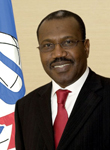Interview with ITU Secretary-General Hamadoun Toure
Geneva, Switzerland, November 1, 2011--At the recently-concluded ITU Telecom event in Geneva, Satellite Executive Briefing correspondent Roxana Dunnette spoke with the ITU’s Secretary-General Hamadoun Touré on the new ITU Telecom format and other issues. Excerpts of the interview:
A s one of the most influential persons in the telecom industry you have a personal involvement in broadband deployment with the creation of Broadband Commission for Digital Development. How is the satellite industry participating in this program?
s one of the most influential persons in the telecom industry you have a personal involvement in broadband deployment with the creation of Broadband Commission for Digital Development. How is the satellite industry participating in this program?
As you know my background is in satellite engineering and I highly value the satellite business. In any service and application, satellite techno-logy is very important. I am happy to have four satellite companies represented in the Broadband Commission and we invite more as we recognize how important broadband is for the satellite industry and how satellites are important for broadband implementation. Together in the Commission we see the importance to promote broadband as key enabler to meet the Millennium Development Goals and there is no better technology then satellites to reach the remote corners of the world. They are all within the reach of satellite communications therefore there are many opportunities to link all remote areas of the world.
How can the use of satellites contribute to the creation of content and m-applications in developing countries and remote areas?
I think there is a bad perception regarding the cost of satellite links. They do not cost more but the satellite industry has to do more to take away this perception. There is no better way to connect rural areas other then the satellite to bring the wealth of knowledge and applications, from health applications to mobile banking, education and to create a positive impact by bring social-economic development to remote areas. That’s why we are linking the broadband with the Millennium Development Goals for people to create wealth and go beyond poverty reduction. Information Communication Technologies (ICT) industry, and satellite is part of it, has shown that this is the one creating new jobs in developing and developed countries. Two-thirds of new jobs are in this sector. If technology is based on innovation, and innovation is one natural resource driven by the brain—a natural resource equally distributed everywhere, we need to see at country level the creation of right legal and regulatory conditions for private sector to come in and governments need to put in place national strategies clear enough to become road maps for private sector to invest giving new opportunities for job creation.
What about the role of the ITU in shaping the strategy for broadband implementation?
There are national strategies in place and our role at ITU is to share the experience so people do not have to reinvent the wheel or waste time, we share good and bad practices. It could be an irony to live in an information society and not make the right decisions because of lack of information.
This is the reason we organized the Broadband Summit at ITU World Telecom in Geneva where the Broadband Commission presented its report to the UN Secretary-General so every country can put broadband high on the agenda. The financial crisis in the world will be solved through ICT, this is where new jobs are created, and the wealth will be created by implementing the right policies for the benefit of individual countries.
Are you happy with the new Telecom event format, where high level people meet, discuss and make things happen?
I am very happy that at the last Plenipotentiary Conference, ITU members took into consideration my recommendation of an annual event. Four years was too long to wait for the next event. Even one year is too much in this fast changing business. It will be annual, more interactive, less formal speeches, more debates, more political and industry leaders will come together to work hand in hand. At this time of financial crisis there is a need for Telecom to be seen as an World ICT Forum where we can invite heads of states and leaders at the highest level and discuss at the same table how ICT can improve people’s lives.
I hope that in the last five years I was able to bring the organization to adapt to the new environment characterized by convergence, change, global E-commerce and green economy as well at the time when we are facing multiple challenges from climate change and global crisis to bringing health and education to all citizens. This can be done only through use of ICTs.






